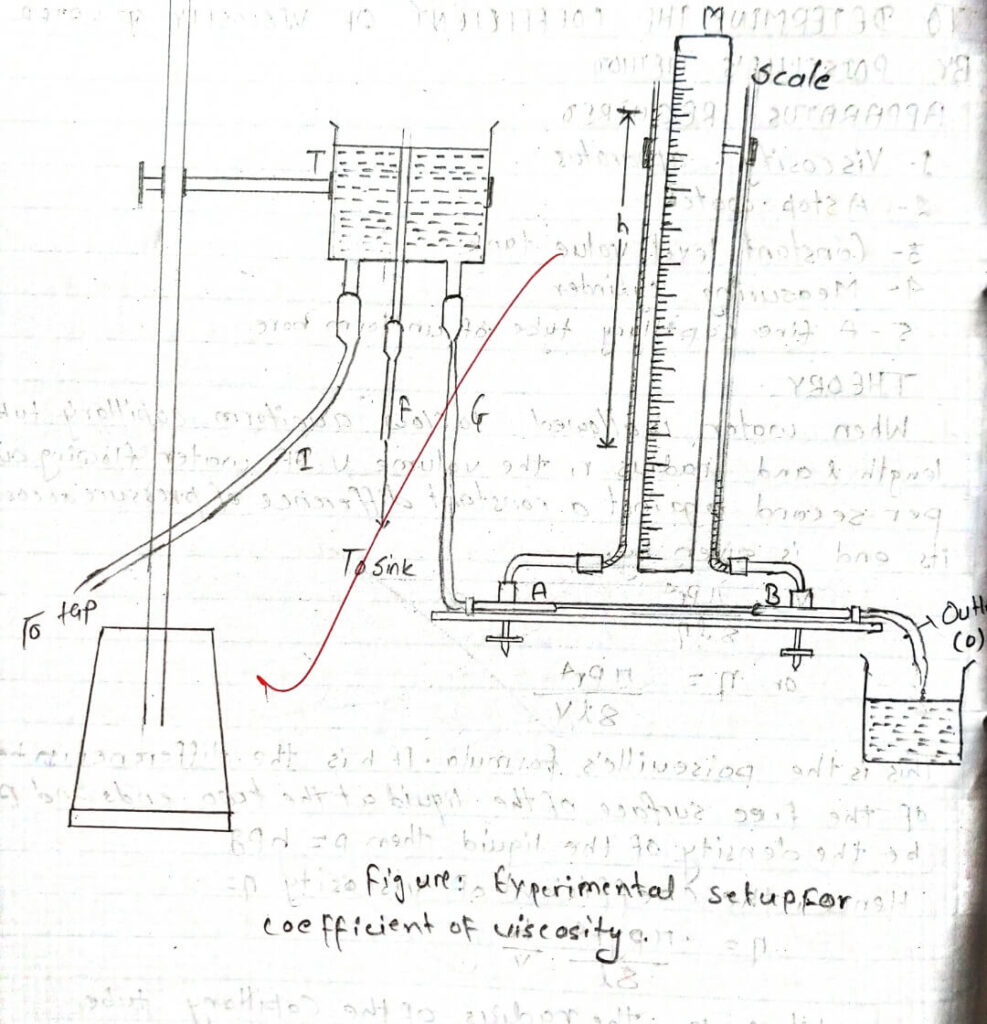APPARATUS REQUIRED
i) Viscosity apparatus
ii) A stopwatch
iii) Constant level valve tank
iv) Measuring cylinder
v) A fine capillary tube of uniform bore
THEORY
When water is allowed to flow a uniform capillary tube of Length (l) and radius (r), the volume (V) of water flowing out per second against a constant difference of pressure across its end is given by.
V= πpr4/8lη
or, η = πpr4/8lv
This is the poiseuille’s formula. If his the difference in height of the free surface of the liquid at the two ends and p be the density of the liquid then p=hpg
Hence, the coefficient of viscosity η= πpgr4/8l h/v
where, r= the radius of the Capillary tube
V = the volume of the water collected per second
l = the length of the capillary tube
h = the reading of the manometer
The above relation holds true only under the ideal conditions ie. when the pressure difference is so small that the liquid leaves the tube in a slow trickle.

PROCEDURE
i) Allow the water from the tap to run into the tank and adjust its flow at such a rate through the inlet tube of the tank that level of water in the tank is maintained constant.
ii) When the flow becomes regular and steady, the water is collected on a measuring cylinder for a known interval of time. find its volume.
iii) Now, change the pressure difference by changing the height of the constant level of the tank and repeat the experiment.
iv) Then measure the diameter of the capillary tube by traveling microscope and the length by ordinary scale.
v) After knowing h/v l and r calculate the value of η from the relation given in the theory.
OBSERVATION
length of capillary tube (l) = 20 cm
Radius of capillary tube (r) = 0.086cm
Density of Water at 19°C (ρ) = 0.99832 gm/cm3
Acceleration due to gravity(g) = 980 cm/sec2
Reading for volume of water per second.
| S.N | Pressure difference (cm) | Volume of water collected | Time in second | Volume S-1 | h/v | Mean (h/v) |
| 1 | 2.9 | 19 | 60 | 0.316 | 9.177 | |
| 2 | 2.9 | 18 | 60 | 0.3 | 9.67 | |
| 3 | 2.9 | 18 | 60 | 0.3 | 9.67 | 9.6048 |
| 4 | 3.1 | 17 | 60 | 0.833 | 9.02 | |
| 5 | 2.8 | 16 | 60 | 0.267 | 10.487 |
CALCULATION
Coefficient of viscosity (η) = πpgr4/8l h/v
= 3.14x1x980x(0.14)4x9.6048 / 8×18.5
= 2.67 x 10-2 N.s/m²
Therefore, η = 2.67 x 10-2 N.s/m² (decapoise)
PERCENTAGE ERROR
standard value = 1.083 x 10-3 poise
obtained value = 2.67 x 10-2 poise
percentage error = standard value – obtained value / standard value x100%
= 1.083 ×10-3 – 2.67×10-2 / 1.083 x 10-3 x100
= 2.67%
RESULT
The coefficient of viscosity of water was calculated to be 2.67X10-2 poise
CONCLUSION
Hence, the coefficient of viscosity of water can be calculated by capillary tube.
PRECAUTION
i) The Capillary tube should be of uniform bore as far as possible and should be held horizontally.
ii) The pressure difference should be adjusted such that water level the tube in the trickel.
iii) A viscosity depends upon the temperature it should be recorded and reported with the result and the Experiment must be done under constant temperature.
iv) The flow of water through the capillary tube should be streamlined.
SOURCE OF ERROR
i) The capillary tube is streamlined.
ii) Error may occur during the determination of the volume in the capillary tube.
iii) Error occurs by the pressure difference in the capillary tube.
